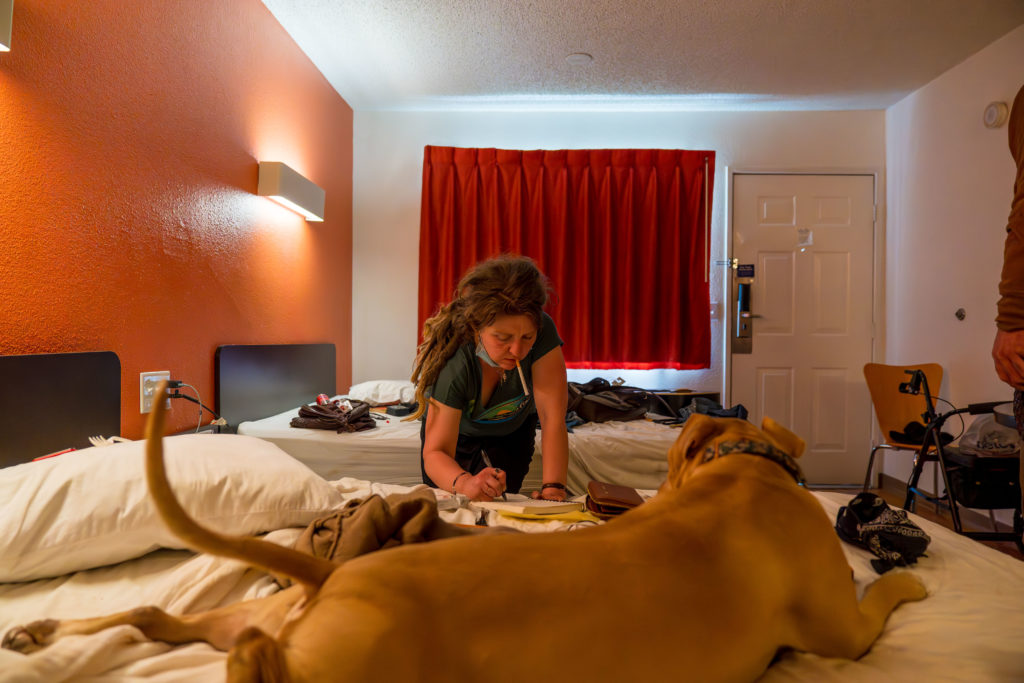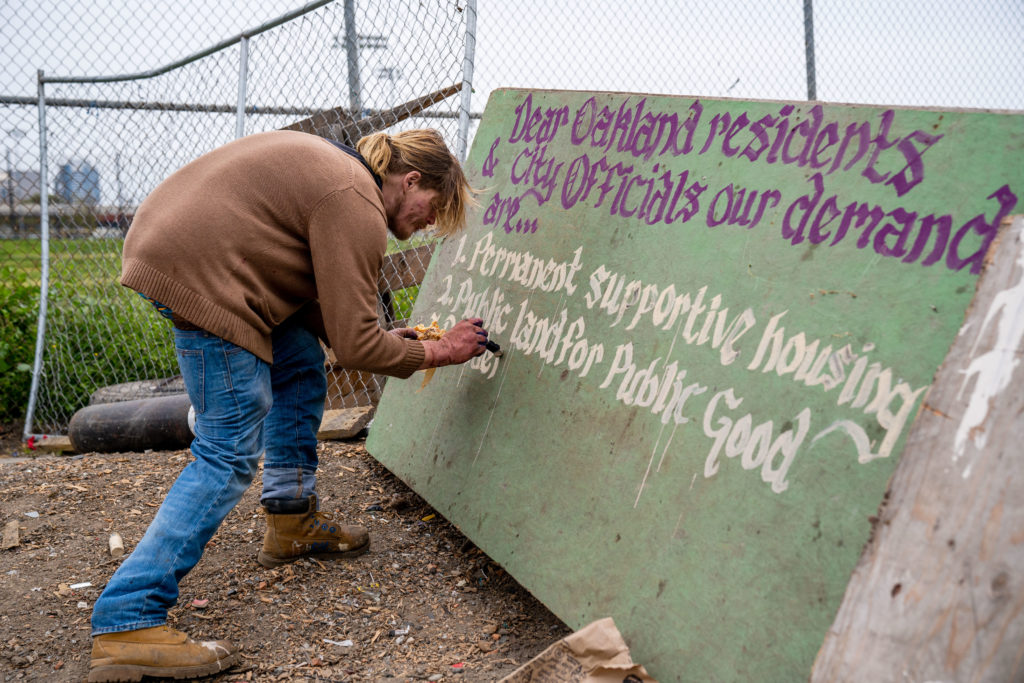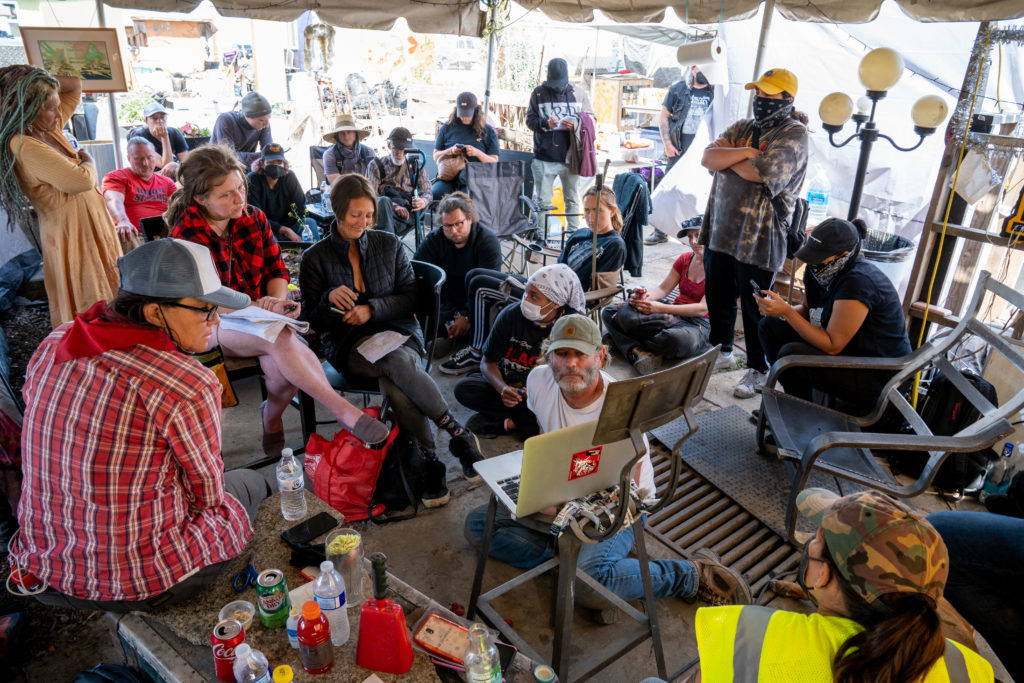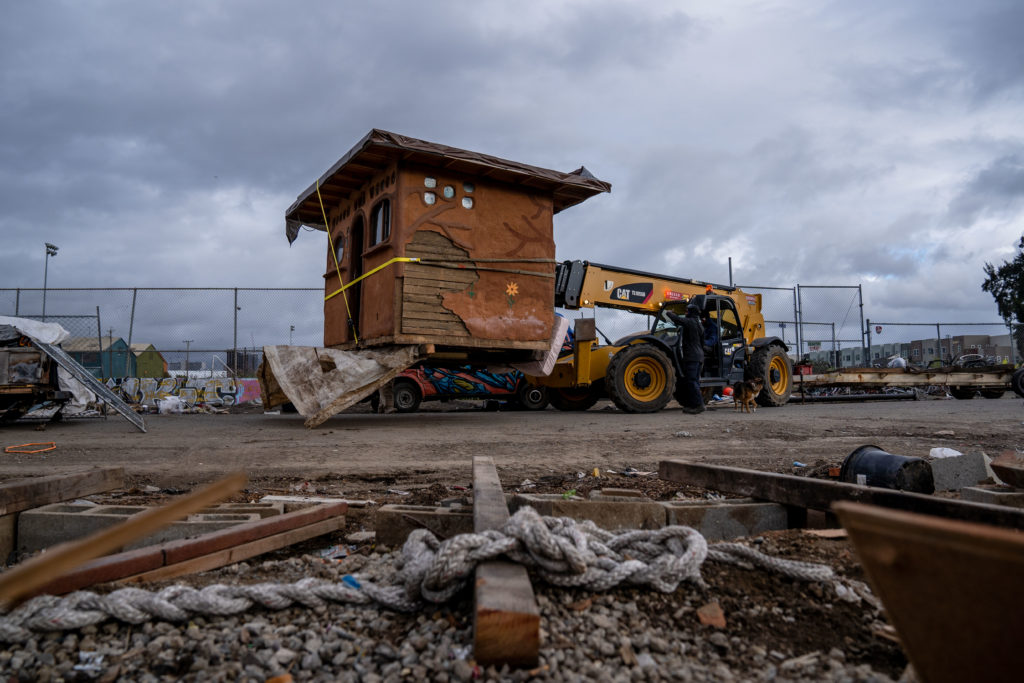At Wood Street, a Bond No Bulldozer Can Destroy
Freeway
The sun was high, beating down mercilessly on the volunteers and advocates, as if to say, “I’m on their side, and we don’t want you here.” They, in this case, were the entire Oakland Police (OPD) force, and an endless parade of Department of Public Works (DPW) workers under the command of Oakland city administrators Harold Duffy and LaTonda Simmons. Before April 10, 2023, those names were phantoms to me. By the time the sun set on the eve of April 12, they had become full-blown enemies—merciless, compassionless, and in control of all our fates.
To tell my story, we have to rewind a little ways. For the sake of time, we won’t go all the way back to the beginning—that would be a novel. We’ll start in September of 2017. That year started when I took my three children and escaped from an abusive domestic partner in Virginia to the “safety” of a toxic relative in North Carolina. Ultimately, this move would result in the loss of everything in my life—first, my housing; then, my job; and finally, the custody of my children. At the hands of my vindictive grandmother, my children were taken from me. I’d like to say there was at least some good reason—drugs, neglect, something—but the truth is, they were taken because my grandmother lied and had money, and the courts and Child Protective Services believed her.
At the same time this storm was brewing, my partner Joel—who had been on-again-off-again in my life since I was 16 and had found his way back to me again that year—was battling his own demons. He had landed in some legal trouble trying to ensure that someone else didn’t lose their kids over weed and, in doing so, ended up on probation. This was proving to be an increasingly difficult struggle and we both knew that if we didn’t get out, and soon, we wouldn’t make it.



On September 16, 2017, we packed everything we could into a rental car that was already overdue, and with $9 in our pockets and half a tank of gas, we jumped. We began driving west. We told no one but a small group of trusted friends and we headed out towards Denver. Joel had a close childhood friend there, and it seemed like the best place to go to get a new start.
In a little less than a week, and with the generosity of strangers, we arrived in the Mile High city. We quickly found out that our clean slate wasn’t going to come easy. After only a short few days, we decided we should get married. We figured, if something happens and we need to stay in a shelter, we’ll have something to prove we’re official. So, on September 25, 2017 in a drop-in shelter in Denver, we officially were married by a notary public.
Funny little fact about couple beds in shelters: there are practically zero!
Winter snuck up on us. Suddenly, it was the first snow and our first night sleeping outside. We were as clueless as it gets, but somehow, at every turn in the road, at every sink-or-swim moment, we swam.
We traveled for a little while, from Denver to Portland to San Francisco. It was during our first time in San Francisco that we found Wood Street in West Oakland. Of course, at that time, it was still empty, and still the hop out. It was only after the One Way—another encampment community—was shut down a couple years later, and everyone trickled over that it began to grow into the haven it became.
From our first visit until the time we finally moved there, Wood Street quickly became our home. We’d go there to find respite, secure in the relationships we’d formed over the previous few years, and each time we’d heal a little bit more. Sometimes we’d find healing from traumas we weren’t even aware we were scarred from.
Eventually, we’d grow restless and eager to spread our wings. We’d start back out on the road, the nomadic newlyweds. But inevitably something would happen that would shock or traumatize us and we’d return, weary, tired, a little worse for the wear. Each time we expected the worst—some forgotten debt, some mistaken identity that would land us in harm’s way or, God forbid, a return to a sea of unfamiliar faces and lost loved ones. But much to our surprise, each time we were granted with warmth and celebration. Unfortunately, there usually was at least one revelation of a friend that had passed on too soon.
Our most recent return to Wood Street came at the culmination of a wayward journey north. We’d set out to make it to Humboldt County and landed somewhere in Mendocino between Willits and Ukiah—a broken down RV the culprit of our dilemma. We had escaped the impending doom that is often the fade of travelers and the unhoused in small towns. But not within a few scars for the road.
This time, it was the sudden death of two friends—shrouded in secrecy, mystery and malice—that determined our return to Wood Street. We carried the only two things that reminded us of our dearly departed: a black Queens of the Stones Age hoodie I had forgotten to return to Miguel, and one of two bike gloves that we never had the opportunity to give back to Philly. The trip took way less time in our newer 2005 Sequoia than our well-intentioned but unsturdy 1971 Coachmaster. We arrived in the Bay Area in less than five hours, with a few pit stops along the way. Our first stop was San Francisco, to find our trusted sidekick Sean, who would be the culprit of this particular return to Wood Street.
Throughout our time here on Wood Street, one thing we’ve unfortunately come to expect is loss. A lesson we’ve learned the hard way, but one which is invaluable, is that death is not the opposite of life, but rather a part of life. Death is the culmination of this life and the transformation into the next—be it our own or that of those we grow close to on our journey. These lessons have come with the sudden, often unexpected, and usually untimely and tragic deaths of people who had become our family.
A little-known pattern or trend that all too often occurs in unhoused communities is the lack of end-of-life services. Be it lack of funds, lack of family, or even lack of remains, for one reason or another, an alarmingly high number of unhoused individuals never receive a funeral or memorial service. Many of our loved ones over the span of time have fallen under that umbrella. And the few that were fortunate enough to have a gathering in their remembrance, were too difficult to say goodbye to.

Because of this perfect storm of circumstance, Wood Street slowly became more than just a safe haven; it became sacred ground. Over the three-block span, we created our own private, sometimes invisible memorials. There, we were able to cry, laugh, shout, curse God, whisper and remember. The names that previously had been etched only in our hearts, began to take shape in the multiple separate gravesites. It became tradition to stop at 24th and Wood streets and smoke with Charlie, or press my hand up against the fence behind which Bob’s RV once sat. At every train whistle, Tink’s name would be whistled, and every Halloween, a special candle would be lit for Felicia. Later on, when a reporter asked me what I would miss most about this place, I said it would be the faces of these and so many more names that would come to mind, reducing me to emotional rubble. It would be all those names that would also fuel my spirit to fight when the first eviction notices showed up in late December.
It was then for the first time, I realized I was a vital and needed member of our community. When someone asked, ”Who could write a letter asking for support,” my husband enthusiastically insisted that I was an ideal candidate, so I took a step that would prove to change our lives. I drafted the “Stand With Wood Street” letter in just a few days. All of a sudden, people I didn’t even know were complimenting me. For the first time since I had custody of my kids, I had a sense of purpose. I had a reason to drag myself out of bed every morning, a reason to try.
This sense of purpose started to surge. As the days turned to weeks, the letter gained attention. Before I knew it, people from other states were signing it in support of our fight. It started to feel like we really had a fighting chance.
And then, one day in late March, it happened. After we had just started to relax, to think we were safe, the city served notice. I remember the day vividly, because it was the same day my oldest had messaged me to inform me that they had just undergone a very invasive surgery. I was already quite emotionally taxed when I walked out and saw the eviction notices. A local journalist who’d been following our fight for its complete duration and had formed a relationship with Joel and me brought it to my attention. Suddenly it became a real possibility: we might actually have to leave this place we call home. All the interviews, all the videos and live feeds, all the letters, all the requests for meetings—and here we stood facing our fate in less than two weeks.
The next two weeks were a blur. We prepared and wrote speeches, as well as planned and fortified our perimeters. We pretended not to be scared, but looking back, I think we all knew what was coming.
The morning of April 10 snuck up on me. Maybe it’s because Joel was sick, maybe I was in denial, but it came and went. So did the next few days. We held them off for the first week. We documented everything, even the evening of April 12 when a small group of OPD officers and an overzealous DPW worker driving a bulldozer rammed into our fence after work hours in a show of force. We had convinced ourselves that we had this, that we could hold them off forever. We were wrong.
I woke up on the morning of April 20 to an unbearable heat and an overwhelmingly menacing thumping overhead. What sounded like war drums was actually the winds of a police helicopter circling above our camp. It was Joel’s birthday. I heard his voice saying “look,” so I opened my eyes. I quickly realized that my nightmare had become reality. Outside our tent, a sea of cops and DPW workers hummed and milled about. Right in front of my door, two of my friends and comrades were being escorted out in handcuffs.
A hot wash of guilt flooded my limbs and face. Suddenly, I was aware that this would be our last day living at the Wood Street Commons. Joel and I turned to one another, as if we’d rehearsed it.
“The van,” we said in unison.
I quickly pulled myself together and stumbled out of the tent. The sun was already high and beating down on the bodies with a sweltering heat and it was barely 9 a.m. The combination of the heat and the sight of a sea of endless pigs overtaking our camp took my breath away.
After fighting through a few overzealous officers and finally arriving at our van, I sat and waited for Joel. Unbeknownst to me, he was fighting his own battle, initially being denied access, then having his access restricted with our dog Zeus. Finally, after securing Zeus in our secondary tent, he made his way to me. It was there that we were told, under no uncertain terms, that we would be leaving either in handcuffs or on our own. The city worker who brought us this news, of course, could only offer us one shelter option: The Community Cabins on Wood. For months, the very fate that we had fought against and rallied about—the worst outcome in our eyes—wanting to be in jail rather than these glorified concentration camps. Now here we sat with that very choice.
There was no real compassion or understanding. Of course, what did we expect? These were the same robots who only days earlier were responsible for ramming through a fence that sat directly in front of two tents, with no warning or reason for doing so. The same heartless organization was now telling us that by 1 p.m., if we weren’t off the lot, we would be arrested and our property destroyed. We were stumped. For weeks we had prepared for this with the understanding that legally they couldn’t force us out. Now, one of our main leaders was in custody—literally for no reason (Google: Ramey warrant)—and we were faced with the threat of losing everything.
At our most desperate moment, our cavalry arrived. I don’t remember the person’s name, or even what they looked like, but I’ll never forget what they said, “I’m from APTP (Anti Police Terror Project) Would you guys like to go to a hotel?” In addition to that, they also towed our van once we left our week’s stay, helped us move, got us groceries, even bought our cigarettes!
Looking back on this time, I realize I don’t remember one single officer’s name other than Gonzales, nor do I know any of the city workers’ names who talked to us about “shelter options”, meaning the cabins. Of the endless sea of DPW employees, cops and Operation Dignity employees, not a single name do I recall.
But I do remember Banasidhe who set up a tent within the gated area and stayed ‘till the very last day, offering medical care, hospitality and being an overall badass—and doing so out of their own pocket. Or Boots, our resident “bossy bitch,” who was there every morning before the cops showed up, and there until after they left, filling the gaps that the city so negligently left for us to fall through. Or James, Jill, Sappho and the countless others at APTP. Sappho literally made themself available at our beck and call. All of them stepped up, going above and beyond what any of us ever could’ve asked for. I remember Sumie, the soft-spoken badass that was willing to get arrested to make sure Joel made it to me on that critical day. Sophie, who had not ever met us, carefully and thoughtfully packed up all our belongings and collected our dog, then watched him until we were ready to leave. Tiny, our comrade from POOR Magazine who showed up ready to rage every single day (Tiny only in stature, GIANT in soul). Rene, Caron, Jessica, and the countless other journalists who put their physical wellbeing, their freedom on the line to show the world our struggle and give us a voice. Bridgette, Jeff, Anthony, Robbie and the countless others who led, and continue to lead, us through the legal aspects of this fight. I never thought I’d have the opportunity to meet one of my personal heroes, lawyer Osha Neumann, let alone befriend him. That is what I gained.
Yes, we lost a lot. We were broken into four times in the first week we were away from Wood Street. Then we lost even more, having no choice but to enter into the cabin program. But the relationships we forged, the bonds that we made that cannot be severed, are invaluable. I don’t know what will happen next. As I write, we’re only halfway through our first full week here at the cabins and were already up against opposition. I know, without a doubt, we’re going to have to continue to fight to be taken seriously, to have any right or humane treatment. But we have something that no program can force, or create—we have our family. We may not all be on the same street anymore, but we were all made by the same struggle,cut from the same cloth. As a dear friend likes to tout, “We’re Lower Bottom, bitches,” and that’s a bond no bulldozer can destroy.

